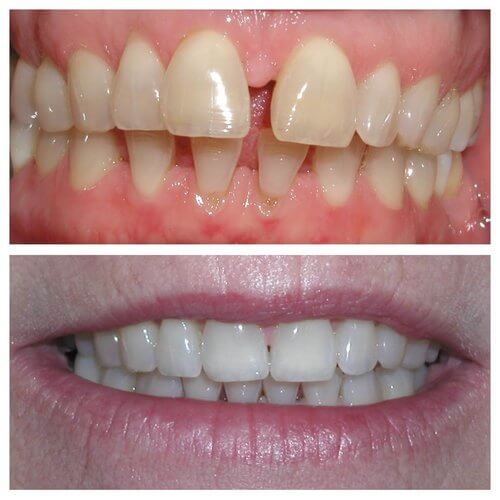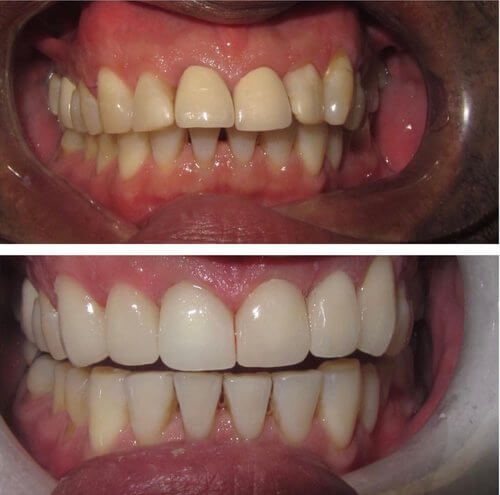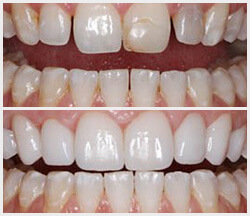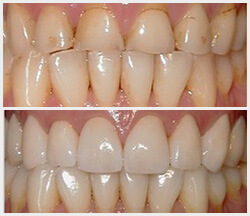Teeth Grinding and TMD: More Related Than You Thought
Bruxism affects millions of people around the world. One of the most serious complications of bruxism is temporomandibular joint disorders (TMD), which can cause significant pain and discomfort.
Explore the link between bruxism and TMJ disorders, as well as tips on prevention and treatment from our dentists.
What Is Bruxism?
Bruxism is the medical term for teeth grinding or clenching. It occurs during sleep or while awake and can be caused by a range of factors, including stress, anxiety, and sleep disorders. When bruxism goes untreated, it can lead to a range of dental problems, including:
- Tooth Wear
- Cracks
- Fractures
- Gum Disease
- Jaw Pain
- Headaches
Symptoms of Bruxism
Symptoms you may experience if you’re suffering from bruxism include:
- Teeth Grinding or Clenching: One of the most obvious signs of bruxism is grinding or clenching the teeth, which creates a grinding or clicking sound that others can hear.
- Worn, Damaged, or Sensitive Teeth: Over time, bruxism can wear down the teeth and cause them to become chipped or cracked. Teeth can also become sensitive to hot and cold temperatures.
- Headaches: Bruxism can cause tension headaches, especially in the temples.
- Jaw Pain: Constant grinding or clenching of the teeth can cause pain and soreness in the jaw, which can also radiate to the ears.
- Earaches: Bruxism can cause earaches, as the constant pressure on the jaw joint can lead to inflammation and pain in the ears.
- Facial Pain: Bruxism can cause pain in the face, especially in the cheeks and around the eyes.
- Sleep Disruption: Bruxism can cause sleep disruptions, as the grinding or clenching of the teeth can wake the person up or disrupt their sleep cycle.
If you’re experiencing any of these symptoms, schedule an appointment with our Staten Island dentists for an evaluation. They can help diagnose the cause of your symptoms and recommend the best treatment.
How Bruxism Can Lead to TMJ Disorders
There’s a strong link between bruxism and TMJ disorders. Patients who grind or clench their teeth are more likely to develop TMJ disorders, as the repeated pressure on the jaw joint can cause serious damage over time. In addition, the muscle tension caused by bruxism can lead to inflammation and pain in the jaw joint, exacerbating TMJ symptoms.
Prevention of Bruxism and TMJ Disorders
Preventing and treating bruxism can help reduce the risk of developing TMJ disorders. Some tips for preventing and treating bruxism include:
- Wearing a Mouth Guard: A mouth guard can help protect teeth from grinding and clenching during sleep.
- Managing Stress and Anxiety: Stress and anxiety are common triggers for bruxism, so managing these emotions can help reduce the possibility of teeth grinding.
- Getting Enough Sleep: Fatigue and sleep disorders can increase the risk of bruxism, so getting enough rest is important.
- Avoiding Caffeine and Alcohol: These substances can increase muscle tension and exacerbate bruxism.
- Practicing Good Dental Hygiene: Regular brushing, flossing, and dental checkups can help prevent dental problems that can lead to bruxism.
Treatment of Bruxism and TMJ Disorders
Treatment for TMD and bruxism varies depending on the cause and severity of your condition. Treatment options may include:
- Mouth Guards or Splints: A dental mouth guard or splint can be worn at night to protect the teeth from damage caused by grinding or clenching. These can be custom-fitted by a dentist to ensure maximum protection.
- Stress Management: Since stress and anxiety are common causes of bruxism, stress management techniques such as relaxation exercises, meditation, and counseling can help reduce the frequency and severity of teeth grinding.
- Lifestyle Changes: Avoiding alcohol and caffeine, as well as establishing a regular sleep pattern, can help reduce the occurrence of bruxism.
- Medications: Muscle relaxants and anti-anxiety medications may be prescribed to ease symptoms of bruxism.
- Dental Work: If damage has already been done to the teeth, dental work such as bonding, crowns, or bridges may be necessary to restore the teeth to their original shape and size.
- Behavioral Therapy: In severe cases, behavioral therapy may be recommended to help break the habit of teeth grinding.
Frequently Asked Questions
Are TMJ and bruxism the same?
No, TMJ (temporomandibular joint) disorders and bruxism (teeth grinding) are not the same, but there’s a link between the two. Bruxism is a habit of grinding, clenching, or gnashing the teeth, while TMJ disorders are conditions that affect the jaw joint and muscles that control jaw movement.
What does bruxism look like?
Bruxism can present differently in each individual, but some common signs of bruxism include worn, damaged, or sensitive teeth, headaches, jaw pain, earaches, facial pain, and sleep disruption. Teeth grinding or clenching can also create a grinding or loud clicking sound that can be heard by others.
Can bruxism be cured?
Unfortunately, there’s no definitive cure for bruxism, but there are several treatment options that can help manage the condition. These include wearing a mouth guard or splint, stress management techniques, lifestyle changes, medication, dental work, and behavioral therapy. Visit a dentist to learn more about managing your bruxism.
Can bruxism cause permanent damage?
Yes. If left untreated, bruxism can cause permanent damage to the teeth and jaw. Over time, constant grinding or clenching of the teeth can wear down the enamel, causing the teeth to become chipped or cracked. Additionally, bruxism can cause pain and damage to the jaw joint and muscles, which can lead to long-term jaw pain and dysfunction. Seek treatment for bruxism as soon as possible to prevent permanent damage.
Relieve Teeth Grinding and Jaw Pain With Customized Treatment
If you suspect you may suffer from bruxism, seek treatment from a dental professional. The longer the condition goes untreated, the greater the risk of permanent damage to your teeth and jaw.
Don’t suffer in silence — schedule an appointment with our Staten Island dentists to discuss your symptoms and treatment options. With the right treatment and management techniques, you can ease your symptoms and prevent further damage. Take action today and prioritize your oral health.



Insurance
We accept many insurances. Please contact one of our Insurance Coordinators to discuss your dental coverage plan.
(718) 948 5111
appointments@sidental.com
Open 7 days a week
Reviews
The dentists are absolutely excellent…
“I have been going here for years. The dentists are absolutely excellent and they always have an appointment available that fits into a busy schedule. I also completed invisilgn and my teeth are perfectly straight now. They also practice preventive medicine and just went in for my 6 month cleaning. Every time feel like I have a new set of choppers and best yet the check up noted no cavities!.”
— J.R
Pleasant visit
“As usual, it was a pleasant visit thanks to Dr. Nasso and her great staff..”
— C.M.
Always treated with courtesy and respect.
“Always treated with courtesy and respect. All of my questions were answered regarding upcoming treatments..”
— J.C.
Smile Profile




Put your best face forward.
Create a positive change to your teeth and your smile.
